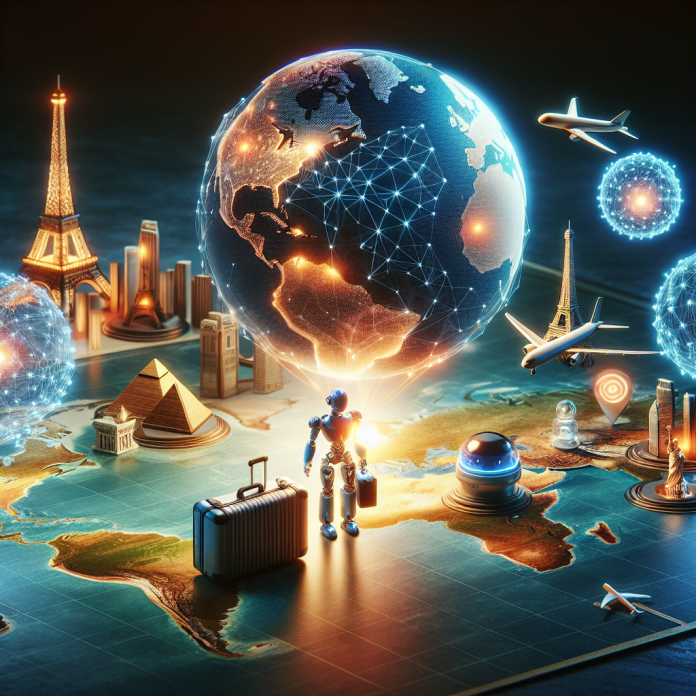Artificial Intelligence (AI) has made significant strides in various industries, transforming the way we live, work, and travel. In the realm of travel, AI has become a powerful tool that enhances customer experiences, streamlines operations, and drives innovation. Let’s embark on a journey to explore how AI has revolutionized the travel industry, from planning and booking to on-the-ground experiences.
### The Rise of AI in Travel
In recent years, AI has become ubiquitous in the travel industry. From chatbots and virtual assistants to personalized recommendations and predictive analytics, AI is reshaping the way travelers interact with companies and consume information. According to a report by Accenture, AI has the potential to boost profitability in the travel and hospitality industry by over 10%.
### AI-Powered Planning and Booking
One of the most significant impacts of AI in travel is in the realm of planning and booking. AI-powered platforms like Expedia and Booking.com use algorithms to analyze massive amounts of data, including user preferences, historical booking patterns, and market trends, to offer personalized recommendations to travelers. This not only makes the booking process more convenient but also helps travelers discover new destinations and experiences they may not have considered.
### Virtual Travel Assistants
Virtual travel assistants, such as chatbots and voice-activated devices, have also become an integral part of the travel experience. These AI-powered tools are available 24/7 to assist travelers with everything from flight bookings and hotel reservations to itinerary planning and recommendations for activities. Companies like Kayak and Skyscanner have integrated chatbots into their platforms to provide real-time assistance to users, significantly improving customer service and satisfaction.
### AI Enhancing Customer Experiences
AI has the capability to enhance customer experiences by providing personalized recommendations and offerings based on individual preferences and behavior. For example, airlines can use AI algorithms to predict which flights are most likely to be delayed or canceled and proactively rebook passengers on alternative flights. Hotels can leverage AI to customize room preferences, amenities, and services to cater to each guest’s specific needs.
### Predictive Analytics and Revenue Management
AI-driven predictive analytics play a crucial role in revenue management for airlines, hotels, and other travel companies. By analyzing historical data, market trends, and customer behavior, AI algorithms can forecast demand, optimize pricing strategies, and maximize revenue for businesses. This allows companies to offer dynamic pricing, promotions, and targeted marketing campaigns to attract and retain customers.
### AI-Powered Transportation
The transportation sector has also seen significant advancements in AI technology. Companies like Uber and Lyft use AI algorithms to optimize ride-sharing routes, estimate fares, and predict demand in real-time. Autonomous vehicles, powered by AI, are set to revolutionize the future of transportation, offering safe and efficient mobility solutions for travelers.
### AI in Destination Management
AI is not only transforming the planning and booking process but also revolutionizing on-the-ground experiences for travelers. Destination management organizations are leveraging AI to analyze tourist behavior, traffic patterns, and environmental data to improve urban planning and infrastructure development. AI-powered smart cities are using real-time data to enhance public transportation, reduce traffic congestion, and minimize environmental impact.
### Challenges and Ethical Considerations
While AI presents enormous opportunities for the travel industry, it also raises challenges and ethical considerations. Privacy concerns, data security, and algorithm bias are some of the key issues that companies must address when implementing AI technologies. Ensuring transparency, accountability, and fairness in AI-driven decision-making processes is essential to building trust with customers and stakeholders.
### The Future of AI in Travel
As AI continues to evolve and mature, its impact on the travel industry will only grow stronger. From virtual reality simulations and augmented reality overlays to personalized travel recommendations and seamless booking experiences, AI has the potential to reshape the way we explore the world. As travelers demand more personalization, convenience, and efficiency, AI will play a central role in meeting these expectations and creating memorable experiences.
In conclusion, AI’s journey in travel has been nothing short of transformative. From enhancing customer experiences and optimizing operations to driving innovation and sustainability, AI has become a game-changer for the travel industry. As technology continues to advance and consumer preferences evolve, companies that embrace AI will be at the forefront of shaping the future of travel. So, buckle up and get ready for an exciting journey ahead, powered by the limitless possibilities of artificial intelligence.

